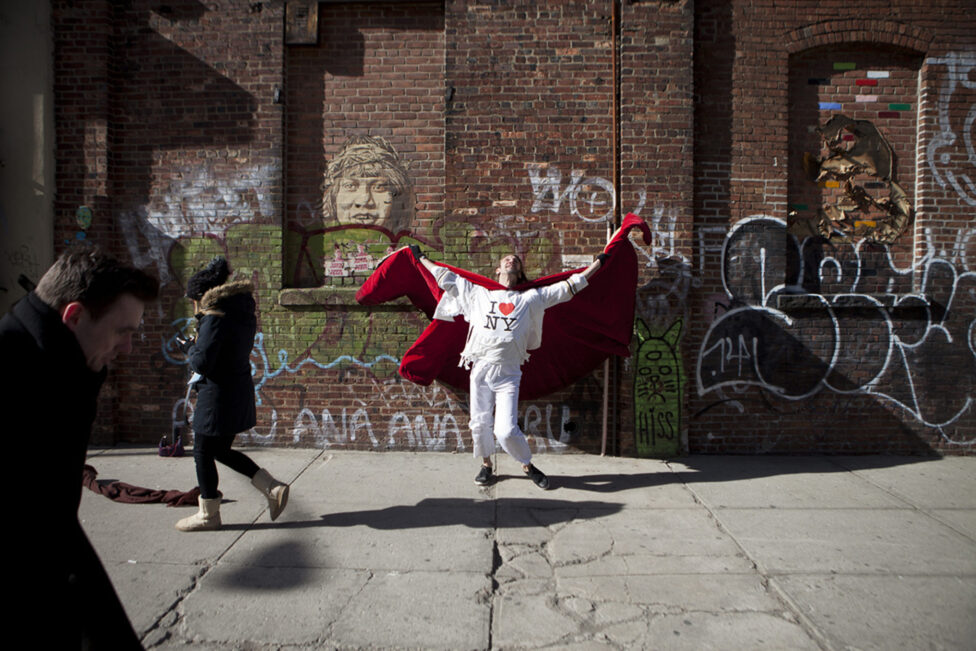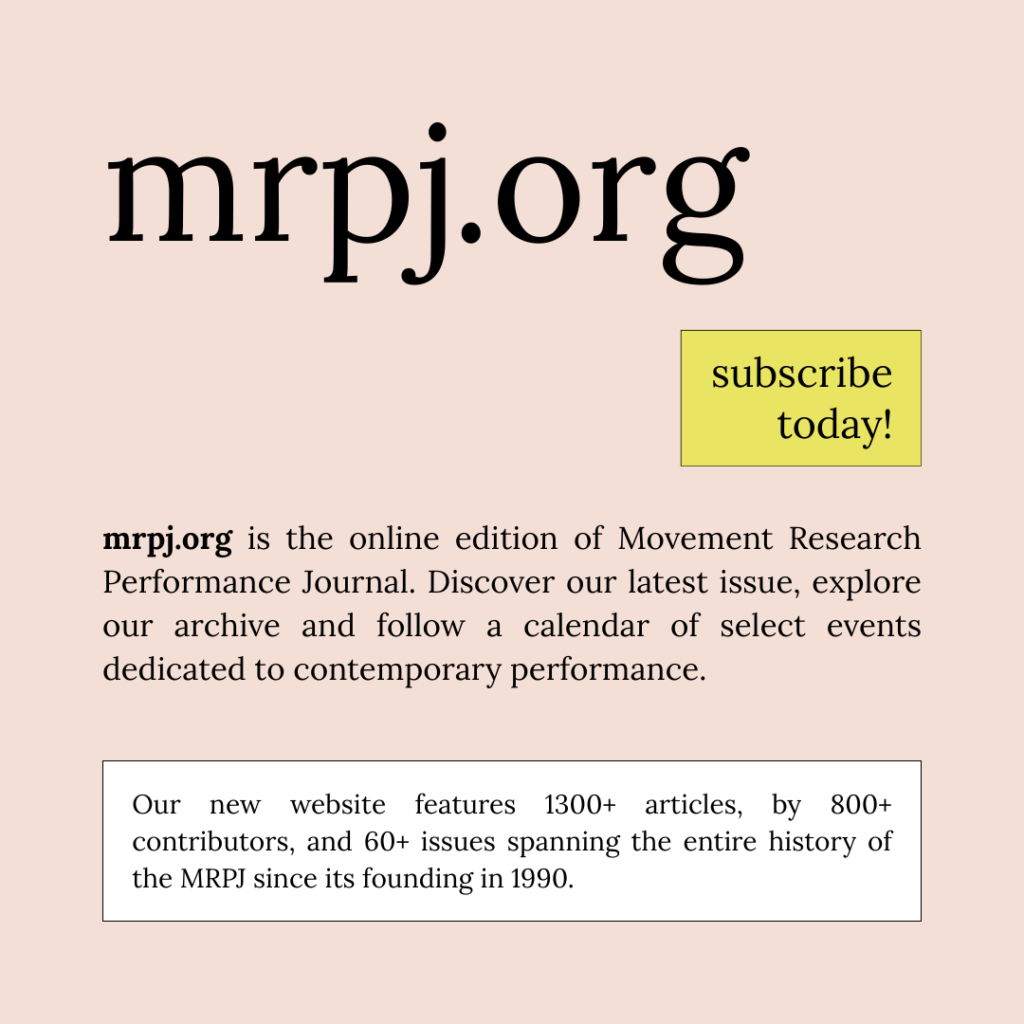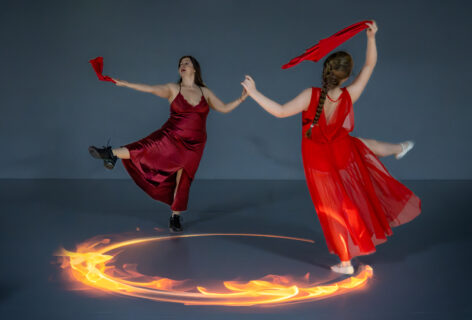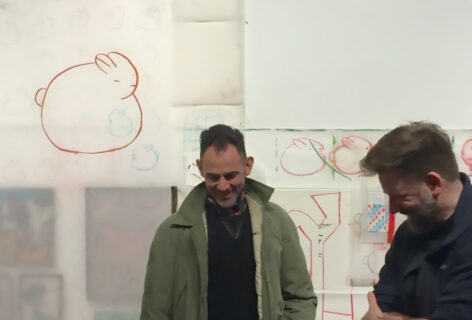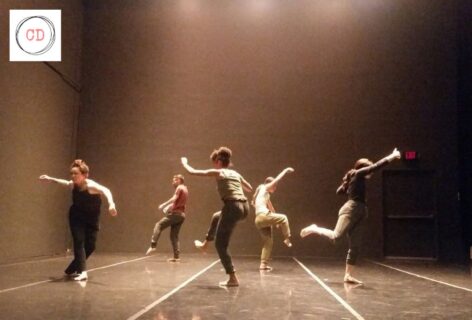MRPJ: I have my own theories about what I think your work does.
Stanley Love: To me, choreography ultimately is complicated. ‘Cause there’s dance, there’s the theater, there’s the process of working with the people. There’s the whole structuring of the work and how you structure something that’s multilayered. Different kinds of music, different kinds of styles, combinations of people. But there is an element for me that I call eclecticism or attempt in diversity of different things. But now it’s starting to come up about humanity as far as that you can have subject matter as well. Or that one section could be an anomaly. Or that one section could be a – just kidding! Oh my God, it matches my pants! Shamrock! Oh my God it totally matches my look today.
MRPJ: Yeah it does.
SL: I was born on Saint Paddy’s day so…
MRPJ: Were you? Congrats. It’s coming soon. Where are you from?
SL: Iowa. I came here, I was eighteen.
MRPJ: To go to Juilliard.
SL: Yeah. Juilliard. But actually I wanted to come to New York because of that Fame movie. And at that point I didn’t study dance.
MRPJ: Wait. You didn’t study dance?
SL: I didn’t start till late.
MRPJ: Till when? Like eighteen?
SL: Like seventeen. Maybe like sixteen.
MRPJ: And you got in to Juilliard? Were you like a prodigy?
SL: It was natural, it is natural. Dancing’s been natural. But the whole line was like, “I’m from Ailey, I’ve been dancing fifteen years, I’m from Germany, I’ve been dancing fifteen years.” And I was like, “I’m from Iowa. I’ve been dancing nine months.” And then I choreographed my own solo. It was to Laurie Anderson, “Born, Never Asked.” And actually I think that’s what got me in but they didn’t tell me until my senior year. But I was lucky at Juilliard that as a freshman I got picked by Anna Sokolow. She was one of those old ladies that is tricky. She called me Danley.
MRPJ: On purpose?
SL: I’m pretty sure, because I would get so mad. She’d always try to get me mad. I’d be like, “Danley’s not even a name!” I’m like, “I told you my name is Stanley!” And then I ran into her two weeks before she died. And I go, “Anna, I’ve been choreographing!” And she says, “That’s great Danley!” And then she winked at me. And it was two weeks before she died.
MRPJ: Wow. That’s quite a story.
SL: I had the funny people. All the old ladies for me. And now I hear their voices sometimes.
MRPJ: When you’re working with people?
SL: Not when I’m working. More like in my life some- times. That voice like Yoda. Or Obi-wan. You feel like you commune with them sometimes. I worked for the Martha Graham Dance Company after the hurricane. The flood happened, the hurricane, and all that shit was underwater for a week so I was in the basement every day going through thousands of costumes. Eighty years of modern dance underwater for a week. Then we start doing restoration. But when we were doing the costumes, looking at the tags I was like, “Oh my God Pearl Lang, Ethel Winter, Paul Taylor, and then Erick Hawkins.” And all of the hair on my whole body went like this and I felt her wake up. Because Martha was there and I could feel her and it was this crazy thing and she says “What happened?” and “Who’s that?” Meaning me. And Martha’s voice was like, “That’s Stanley.”
MRPJ: When did you do this?
SL: Whenever the hurricane was.
MRPJ: Sandy.
SL: So yeah, Sandy for a year and a half. And then she got a little – Graham stuff can be a little dark, she’s manipulative. And I felt her wake up.
MRPJ: You’re talking about…
SL: Martha Graham. The person.
MRPJ: Herself. The ghost. How old was Martha when she passed away?
SL: Ok, this is the thing. She said 95, but the first thing Martha Hill said when she came to the school, she goes, “She wasn’t 95. We lied about her age the same year.” They were roommates together in 1930. She’s like, “We both lied about our ages the same year.” I was like, “Why are you gonna be lying about your age when you’re 95?” She says, “I was making my age older. Like, I’m 120 and don’t look a day over 93”. She was crazy. And then she entrusted Ron Protas – that’s why they’re in a twenty year lawsuit. ‘Cause he had all the stuff, she left him all the rights to everything.
MRPJ: Why did she do that? ‘Cause she was in love with him?
SL: Because he took care of her. I did work-study with Martha Hill and then Ethel Winter I’d always ask questions to too.
MRPJ: Ethel who?
SL: Winter. She was in Graham for thirty years and she was the first one to take Martha’s solo. Anyway. But they were like, “I’m not gonna take care of Martha ‘cause no one would take care of her.” So Ron stepped in and took care of her, ‘cause nobody else was going to. Then she makes all those dark pieces about women killing men. “Let’s kill another Greek guy. I’m gonna fuck my son and kill him or something.” I mean, who knows whatever all that drama was. She tore Ethel’s dress one time to get her to dance more angrily. The night before she had to go on stage and Ethel had to sew it up and dance.
MRPJ: To get anger out of her?
SL: To get her to dance angry, yeah. That’s some old school shit. That’s what I’m talking about.
MRPJ: How to direct—
SL: Yeah and how to be human. These are human beings. We’re human beings.
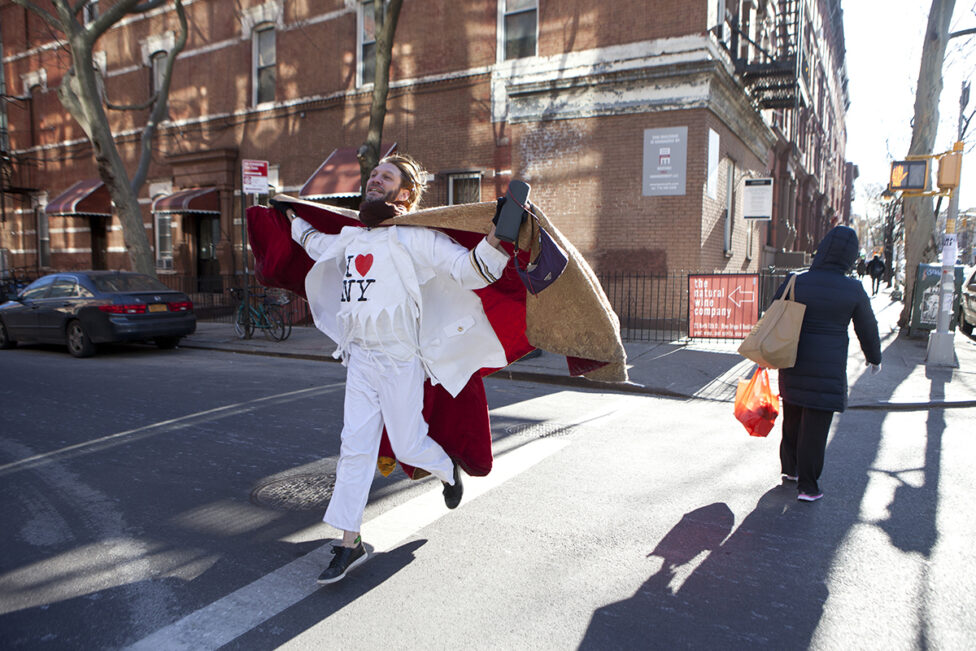
Stanley Love, 2017, Photo by Miana Jun
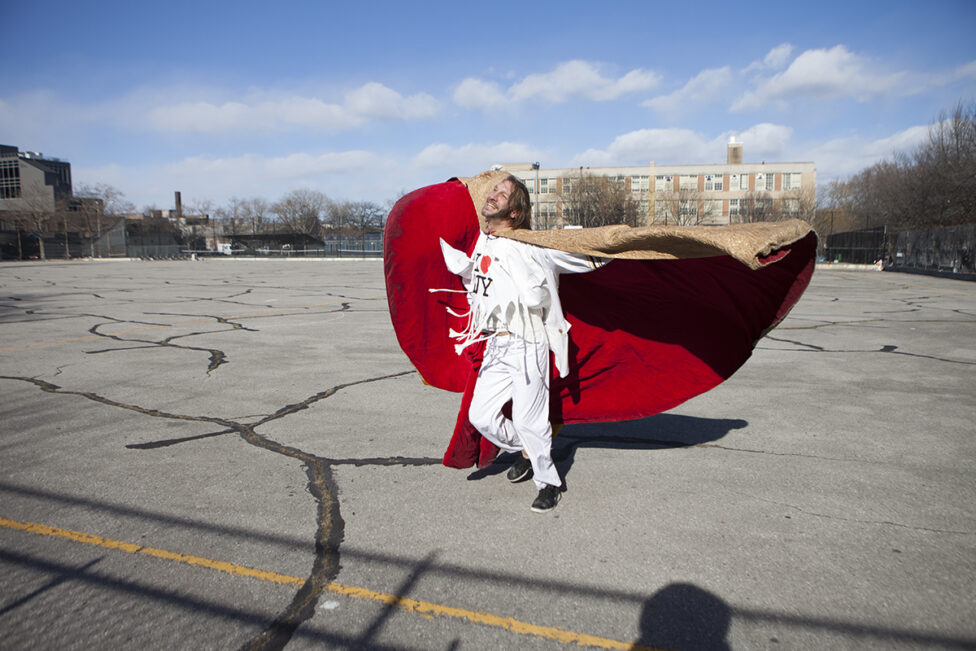
Stanley Love, 2017, Photo by Miana Jun
MRPJ: Why did you do deities?
SL: Because we had this chant where it was like, “Get off my land,” about war, religions, and that spirits are all from the same source and we’re all getting along, all the gods and goddesses, we’re all getting along, having a spirit party. It started for me just with the idea of the soul train line.
MRPJ: So you did a soul train line of all the deities.
SL: We’d be like, “Go Buddha! Go Moses! Go Buddha!”
MRPJ: To what music?
SL: It was “Rigor Mortis” by Cameo. It’s just kinda funky. We had the Japanese girl do Buddha but she did like a Thai Buddha. She’s ballet trained from childhood, left that to be an artist and now she’s back. We had a few people like that. I had two moms that had quit dancing, moms who danced and then stopped dancing and I got them to come back.
MRPJ: Where do you find the people you work with?
SL: By chance usually.
MRPJ: Just life.
SL: Divine. To me, my relationship to spirit is very divine. The universe brings me what I need a lot. Some things you miss, the boat, it’s just off-timing, but sometimes it’s not.
MRPJ: The deities dance sounds like political critique but still using the mechanisms of theater. Which is very representational. More so than your other works.
SL: Well right now, we’re all dancing.
MRPJ: Right. And you’re only dancing. And you endlessly dance.
SL: That’s just what we’re doing right now. People want to put a thing on you. And I know what I’m capable of which is – it’s called Stanley Love Performance Group – when I imagined it. But I started with something like, “Ok, we’re all gonna dance with chimes!” It would be like a chime bowl dance. We meet twice a week, maybe some people I see once a week. When you do once a week basically all you do is remember what you did the week before. So I can’t really build very quickly. Right now I feel the most important thing is to just be cool wherever we are in the moment. We’re not winning an award, we’re not competing in the Dance Olympics. It’s not “So You Think You Can Dance?” What matters is every single move, you’re still enjoying this process, this experience of living this thing we’re doing. And that’s where I mean I’m old enough now where there’s no rush to get anywhere.
MRPJ: Right. You’re just doing your –
SL: Thing. The practice.
MRPJ: Right. But what do you – if someone comes to you, how do you introduce them to the practice?
SL: I just tell them when rehearsal is. All you do is show up to rehearsal. We start there.
MRPJ: Like, do the moves, spend time? Follow along?
SL: My ideal is for you to get up and follow along behind and see how fast you can pick up. Just for starters.
MRPJ: It can just be like dance class in the park.
SL: We do a lot in the park, when it gets warm.
MRPJ: When it’s cold where do you rehearse?
SL: That becomes part of my challenge to see who’s giving me a free space. Because I made less than ten thousand dollars a year for twenty-eight years in New York City.
MRPJ: So I hope your rent is low.
SL: Yeah, I’m rent-stabilized.
MRPJ: That’s good, right?
SL: That allows me to do this almost like charity work. But the thing is part of me almost gets addicted to having no money. Being like this…
MRPJ: Suffering…
SL: Well and like charity. One dancer always brings
me food, every time. It’s also with her, I feel like an offering, which is cool for me in that sense ‘cause if I was a dance teacher, if I was teaching class, they’d be paying me money. But also they’re dancers so I’d be paying them so that’s why I don’t feel bad. I wish I was able to pay them at their job but there is also the other side of when you don’t have money involved with art, art has a whole different appeal.
MRPJ: Right. Speak about that more.
SL: Well the power of people with money and money and power. That’s why for me, where I am now, it depends. Who am I gonna dance for free for? Where am I gonna put my energy? Who am I supporting with my thing? I’ve had to come to terms with not feeling bad about the money or to recognize the beauties of also being free. Having an art experience that has not been touched by money. ‘Cause people do crazy things. People do so many things they don’t wanna do, for money. “I’m gonna take this job – I don’t want this job, but I need money.” And whatever, for survival. But I do other things for my survival. And my art not being affected by money is something that’s beautiful to me. And that’s why I’ve been able now to get my work to this place that has this very unique—
MRPJ: Position. ‘Cause there’s no money in it. Or exchange, right?
SL: Well, I made the bracelets. But yeah, there’s no real money. I’m transparent about everything. That’s the thing. I don’t hide shit. That’s when it starts to get bad, hiding it. That’s what I’m saying, getting into this energy work, the purer the better, the stronger, the lighter. ‘Cause last time I was light. Like, white light I would call it, this piece. The audience was super happy, the dancers were super happy, there was a spiritual message. Also dance is spirit. ‘Cause I used to joke that cheer is not a word that you hear very often. “But that’s what we are, the cheerleaders. And they should really call us inspiration leaders. ‘Cause that’s what we are!” That’s from Bring It On.
MRPJ: That’s what dance is?
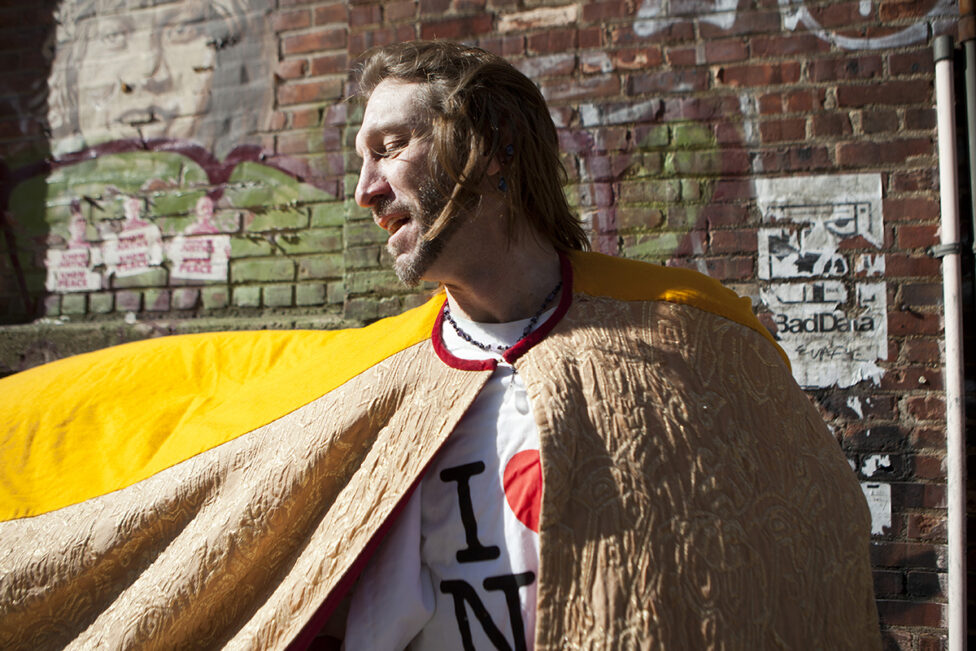
Stanley Love, 2017, Photo by Miana Jun
SL: We inspire the community to believe. We’re inspiration leaders. ‘Cause sometimes I’m like, “Oh my God, I’m just fucking dancing around, what the fuck am I doing in the world? What am I doing with my life?” But then we actually do it for people, they have to remind me sometimes of what we do. It’s special. And not everyone does that kind of thing or gives that kind of experience to people. I mean, depending on your style of religion, or style of spirit practices. That’s where for me this piece with the Buddhist style or the Hindu style or the Krishna style. We have these styles of spirits, underneath it’s all the same. Where for me how we choose to channel that spiritual energy, how we choose to channel that inner life, it’s all the same, it’s like clothing for me. It’s like, how do you dress? What’s spirit is spirit. We all have souls, we all have energy, freedom. And we have people kill each other over that shit. That’s what I’m talking about – war. People are sending other people to kill for them people that they don’t know. Murder’s so intimate.
MRPJ: Intimate.
SL: Yeah. I was thinking about that the other day. But I don’t want to get too Debbie Downer.
MRPJ: That’s OK. But tell me more about this energy work thing.
SL: That’s like part of the process of the humanity thing. So it’s like when you’ve already lied – if you start lying you have to lie more. But when you’re more open – the audience can feel that energy too.
MRPJ: That honest energy?
SL: Yeah, all of it.
MRPJ: Can you talk about that with the people that you’re working with?
SL: The people that I have now, I love them, I love everybody, so deeply and we all love each other. That’s been the work too, I’ve found the people who somehow can work with the other people. It’s a big deal. To find that balance. ‘Cause I’ve had one person fuck shit up for everybody. One person can destroy it. This last year we really reached a level of sharing and being open. I really feel it’s the purest my work’s ever been.
MRPJ: When you say “pure,” what do you mean?
SL: Like no negative, everybody got along. Everywhere’s open. There’s this loving. ‘Cause before I’ve had dancers where it’s about attention, for them. Or they’re just oblivious to the other dancers they’re with on stage. And they’d be damaging the work in some ways. I mean, I feel like the work is its own thing. In the same way the work is all of us together. Somehow there’s this ghost of energy in my work, it becomes the work. And luckily now some of the dancers, they see it and understand that. And also now I really know it takes a village. ‘Cause some of the dancers are moms, and they bring their kids. That’s my favorite, when they bring their babies. Even though it takes us a lot longer to do shit, and we don’t really get that much done, I fucking love that shit. It makes it my life. We are the village. We have the widest range of dancers. Wide range of dance textures. Meaning experience. But I don’t like saying “non-dancers” ‘cause someone who dances is a dancer. I don’t like the word non-dancer anymore. That doesn’t work for me. ‘Cause everyone’s dancing. All you have to do to dance is dance. It’s that simple. You don’t have to have a degree. You don’t need permission. All you gotta do is dance. Period. That’s dancing. Dancing is dancing.
MRPJ: But what is dancing to you?
SL: Moving!
MRPJ: So you have to move to dance.
SL: Well, I mean, of course when I talk about stillness it’s movement, of course. I was an art model for fourteen years and I’ll tell you to be breathing, honey. You wanna talk about stillness? So there really is no stillness. We have the blood flowing through our veins. So to me, let’s not be an asshole about it. If that’s what you wanna do, great. Go for it. And believe me, it’s cute but like for my practice, I guess an asana is something you’re still breathing and moving. And I love an asana. ‘Cause I’ll be like, ok fine, I’m a cobra right now. I get into that whatever it is. I’m really a tree, or I’m really a cobra, I’m really a bridge or whatever. Even that’s alive. You’re still alive in stillness. So for me to get obsessed with that is super heady shit I don’t really need in my life that much. But I can respect it. If we’re gonna dance let me dance around you and you wanna hold still in your dance, great, go for it. We’re gonna be dancing around and having a fucking blast. Or maybe I’ll cry during the Whitney this time. I cried this time.
MRPJ: During the Whitney Houston.
SL: Oh my God, we did it three times. And one of the times I cried. ‘Cause I was thinking, oh my God, this is me if I didn’t survive. ‘Cause she’s like, “and I’ll always love you if you leave me” and it was while I was dancing part of my solo – if I would’ve not made it through one of my drunk episodes, and if I died. That’s what I was dancing. And I made that ugly face too, when you’re about to bawl. I just held that on stage this time and that was really deep work for me. Which is sad but also therapeutic or cathartic to dance the part of myself that would’ve died. But mostly I try to be in joy right now, and the fact that I survived dark times. Very very very dark times. So that’s why I started making stuff about joy or the depth of joy. To be joyous, to be deep. That’s what I’m talking about the process of energy, to really be with people sometimes, it’s not about everybody doing the dance step perfectly. It’s so much more important than this idea of perfection, or winning. Like a lot of the time, with rehearsal, we’re all gonna do the same part, however you do it. So I have the dichotomy of the reality of individuals with the universal reality. It’s like both realities are real. And that’s what the work is.
MRPJ: I would like to hear you talk about your use of pop songs. Let’s talk about that and about repetition. And I also wanna hear you talk about your use of unison.
SL: It’s more practical we all do the same thing, I can have more songs. I like to have a wider range of songs. I have a Meredith Monk song, I have a Journey song, that style of eighties video jazz dance, that’s its own little capsule, it’s the only one like that. A lot of it is just songs that I danced to growing up or that made me wanna move. It’s either emotional or rhythmic or something with both. Usually I have to hear the song about a hundred times and I’ll listen to it—
MRPJ: Yourself.
SL: Yes. A lot a lot. I have a list of songs I’ve been wanting to choreograph. I’ve choreographed to over five hundred songs. Not the whole song.
MRPJ: You should print that list! I think that there’s something really interesting in the essential experience of watching your dances. One, I think they’re very deeply connected to what pop music is. Or can be. In a positive way. And also it’s meta. It’s deconstructing all the mechanisms that are part of our shared social imaginary. Because of the repetition, I think. Because of the unison. Because of the diversity of performers and because of this shared pursuit of the joy of it all.
SL: So that stuff, the joy. That stuff’s really pure. And sometimes the pop song thing is really pure. ‘Cause people love and they feel something. I love a song, it’s not the greatest song, but it has an emotional truth that people relate to that somehow is something. But then there’s different readings ‘cause some of them could be such tacky pop songs that people don’t know if I’m making fun of it. I’m not usually making fun of it.
MRPJ: Right.
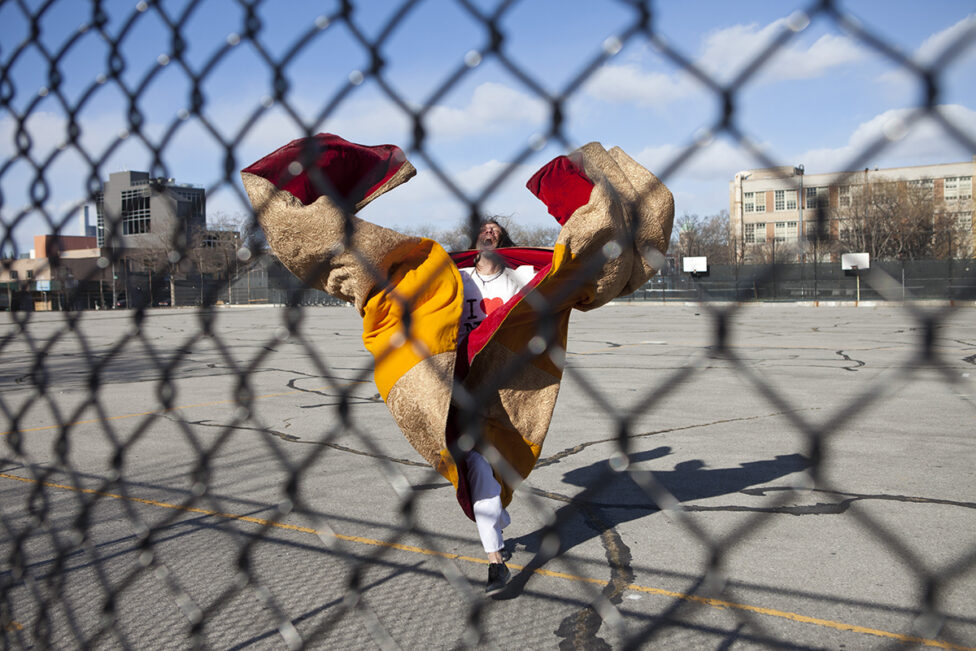
Stanley Love, 2017, Photo by Miana Jun
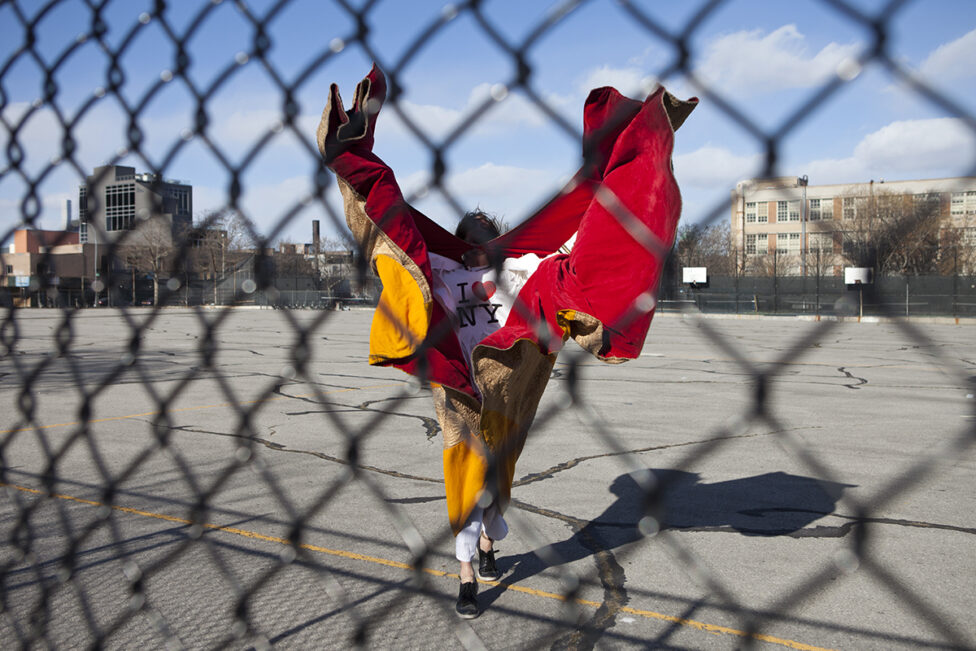
Stanley Love, 2017, Photo by Miana Jun
SL: But then there’s something like repetition, depending on what I do sometimes it’s just twice, because we’ll do a different spatial arrangement. Or we’ll repeat something ten times. I’ve done a lot of different ways of using it.
MRPJ: Of repetition.
SL: When you start to do something short a lot in a row, or even something long a lot in a row, it alters time. I’ve just used it during a time period, a lot. I had one concert, and it was all twice. I had one concert it was all three times. And depending on what song, it has a different effect too, how repetition would work, whether it’s emotional or whatever. But you can start to change time. People hear it again and they hear it again, they almost go into a trance. So for me, performance being a time thing, it can exist in time to change time, sort of abstract consciousness. Someone’s consciousness starts to become abstracted. And that’s not as entertaining, too. Because pop music can be so entertaining but I can easily deconstruct it by cutting it out or repeating it and then it starts to become this other thing. Sometimes I just do three pop songs and it’s fluff and it could be seen as joyous that way, but it depends, each piece. That’s why I have years of experience of doing these arrangements or different structures. That’s why I think the structures can be a big part of it too, within
the aesthetic of the work. It’s different than how I’m gonna structure it all together. The order. Just the order of the songs. At this point in my career, I’ve got to edit. What’s the most important thing you want to say? You don’t get to say twenty things! And it was the spirit soul train line thing. It was the most important thing. It made me decide and then it makes the piece feel more like a message. We have the dancing portion which shows that we are spirit, what we are doing is spirit work. And then we literally turn into deities. And we’re all hanging out together. So we did the repetition. But also there’s a lot of misused repetition. That gets into the technical structure. That’s my Aquarius. I get heady with that. That’s all within me. The dancers don’t have to know what’s going on with all of that.
MRPJ: With the structure.
SL: Right. They don’t have to understand it, really.
MRPJ: You don’t think?
SL: Not unless they want to. But normally, no, they just have to enjoy these dances. Their work is how they interpret. To me it’s about the soul of the song. A lot of times I’m really trying to honor the music. What is the song, how do we respect or honor the soul of the song? Usually we follow along this thing but there might be one thing that’s stuck in there on purpose. But then I’m lucky where if something goes wrong in the show and I have to start the soundtrack over – something goes wrong usually. And I don’t know if I’m cursed with that now or blessed. But then I have to stop and for the audience it’s live. That’s our thing too, that we’re live. Life’s not perfect. We’re not trying to be perfect.
MRPJ: Do you feel like you’re part of a certain type of dance community? Or that you’re making your own dance community? You know what I mean? ‘Cause you went to Juilliard. Probably your classmates are doing something very different from what you’re doing.
SL: Well, I left them right away. I was like, “Taxi! Drop me off downtown!” with my degree in my hand. “Anywhere downtown.” And even being from all over the world in the school is an education. That dance in Thailand or in Mali is equal to the City Ballet. Instead of just getting dance jobs at dance companies that can pay the most money. That there’s a dance culture everywhere around the world and we need to be more aware of the realities of dance on the planet earth and not just who gets paid to dance and is considered a successful dancer. Dance is spirit. Rituals to summon the gods and goddesses. Originally, it’s not a job. And also fucking is the most ultimate dance form, ok? I put that on one of my grants – I did not get that grant. But I was serious. Love-making is definitely a real dance form.
MRPJ: Well and in a lot of the use of dance in ritual there is ceremonial rite of passage for that act.
SL: Totally.
MRPJ: I mean, even social dances.
SL: Exactly. You’re right.
MRPJ: Or why we dance at weddings. Why is there always dancing at weddings?
SL: Mating. Like a mating ritual.
MRPJ: Dancing is like a mating ritual. Or it can be. It can also just be like a social ritual.
SL: Yeah. I mean within one of my sections it could be like ten different dance techniques in one phrase. Or it could be kooky.
MRPJ: It seems like you mostly use found movements. There are a lot of references to dance styles.
SL: I go sometimes like, “Fosse, Fosse, Graham, The Birdcage”. But it would only be a joke to myself. “Fosse, Fosse, Graham, Graham. Limón and go!” Now I feel like I have different styles of me within my own style. Like my Meredith Monk style’s different. It’s more maybe archaic, gestural. Dramatic gesture, spirit summoning. I call it summoning the intergalactic guardians of the planet earth. I guess my Limón would be more how I would do fall and recovery. But then I have swoopy arms and I’m working on my Shiva spiral arm thingys. Or even going to the different dance clubs for years and years, I have many many club styles.
MRPJ: Many moves?
SL: From dancing eight hours straight a night on ecstasy for like ten years. Not every night. Every weekend though I would go out on drugs for ten years.
MRPJ: Do you go dancing in the clubs anymore?
SL: Not now. I haven’t for awhile. I’m not doing drugs anymore right now.
MRPJ: But you have all these sober dance clubs that start at five in the morning.
SL: I don’t really like what they’re spinning. I don’t like the music. That’s why I feel like I’m getting old. If I like the song I can get down right now. But I need to find the DJs playing music that I love. ‘Cause that’s for me, I can’t really fake it. If I don’t like the song, I can’t. But if it’s real, it’s divine for me, it really is. There’s something about sound that’s divine.
MRPJ: So you’re still in a music and dance continuum and relation.
SL: Yes. Music is why. Music is the main source.
MRPJ: So it initiates movement, for you.
SL: Mostly. It initiates—
MRPJ: Have you ever danced in silence? Initiates what, the soul?
SL: The seed of it. The seed of the soul. Do I ever dance in silence? Not really. But there’s really no silence ‘cause even if there’s that snowstorm on Saturday and I was out in that spinning around. But there was the music, the snow – it wasn’t so much sound based, though, that one. But even movement, visual, is almost like a song to me. But sound affects me deeply. And the style of sound. At the awards ceremony the other night for the dance film whatever, I haven’t heard strings in awhile and then strings came on one of them. And I start crying. And the more clean I am, the more sensitive I am. And sometimes I’m over-sensitive too. I have to be careful, ‘cause I can get sad. But that’s part of the work too, is being able to channel. Like acting is dangerous. That’s why I stopped doing that because you become the role. You start to draw the line, you know, and it can be dangerous if you don’t know. That’s why sometimes I don’t act, I just wanna be what it is, I wanna really be that. But that’s why I start to go crazy, like – I really am Jesus. In the nineties when I did it, I was really Jesus Christ. And then I ended up in the psych ward at age thirty-three. I was making this movie where he ends up in the psych ward and then I really ended up in the psych ward. So that’s where I have to be careful. I’m still working on that.
MRPJ: Well that’s a gift.
MRPJ: Well that’s a gift.
SL: Well it’s a gift to still be alive.
MRPJ: To be able to imagine – to become what you imagine.
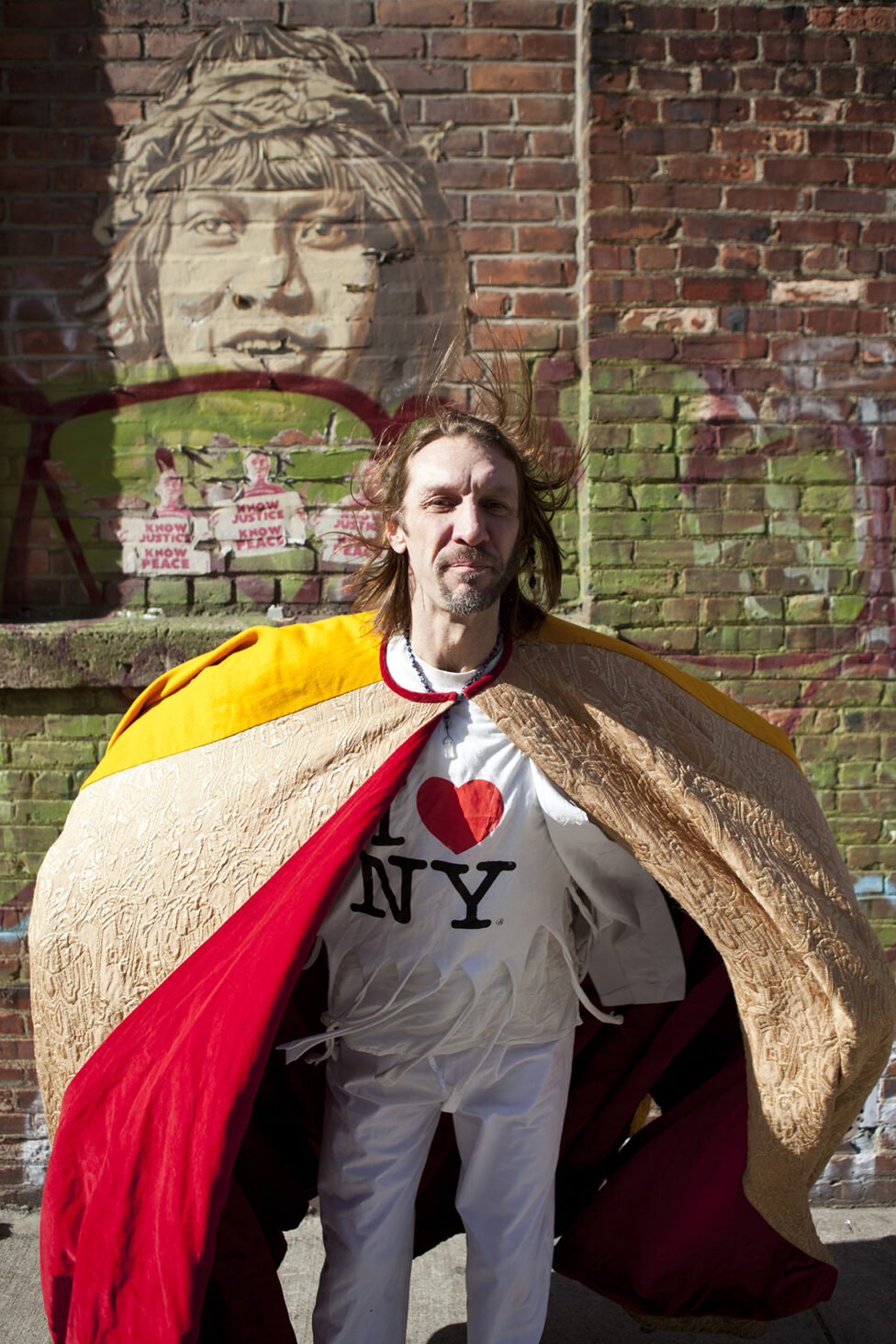
Stanley Love, 2017, Photo by Miana Jun
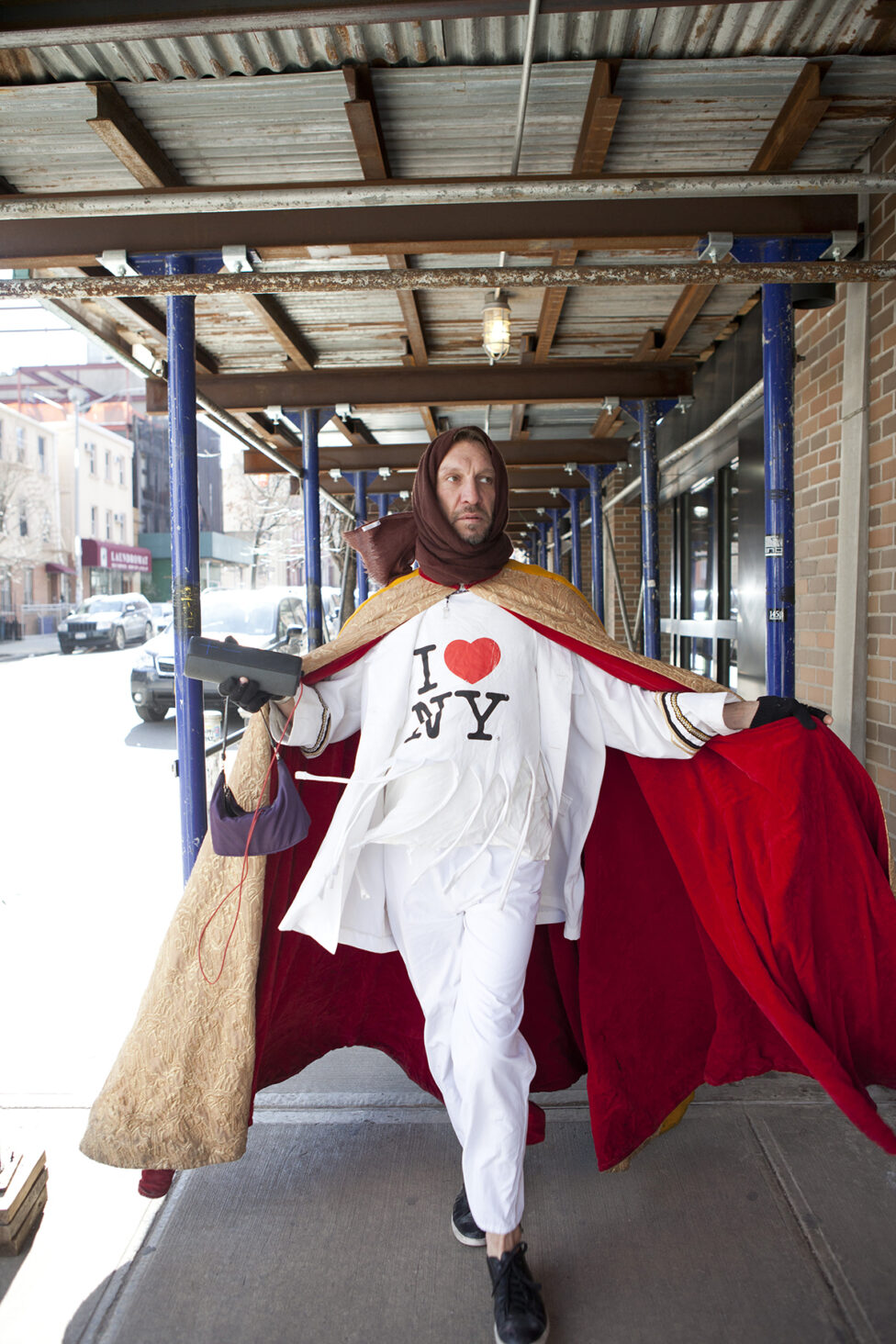
Stanley Love, 2017, Photo by Miana Jun
SL: Yeah. I do my thing and I’m like, artist, do your thing. I mean that’s like, “Do your thing. Hold still. Great.” You’re in charge of your art. That’s the whole thing you’re supposed to be – it doesn’t matter what anyone’s thinking about that whole thing. But I just don’t feel like I fit in. It’s not important to me anyway to fit in but sometimes I think, “Oh gosh, we’re really, we’re doing the pop music.” Sometimes I feel like they look at us like they don’t know what to do with us. Also they’re so serious. That’s even at the gallery, the art people coming in. When we did the opening night, it was a wall of people wearing all black. And we’re like, “Can you feel it? Shakin’ that WOO!” But after it was over they were saying “Oh, we loved it.” But all of them wearing black ‘cause they were a serious art crowd. Luckily we got plants, people that knew that show part. But even Movement Research at the Judson Church sometimes they’re like that too. One of my friends was shouting “WORK!” for us and then people in the audience would turn to her and were like, “Sshh.” And then I have to have a talk at the beginning of my piece: “It’s ok to vocalize. If someone says ‘work’, please be inviting. We’re going to invite the word ‘work’ in.” Also I try to be compassionate about all of it. But I feel like sometimes I don’t have a place in the scene. But it’s not important. The most important thing is to do the work and whatever will be will be. What’s the source? I have mine. I’ve spent time developing this, too. That’s the thing. As artists you have to earn your—
MRPJ: Earn your keep. Not your keep financially but the deep artistic intention behind your practice. That takes time.
SL: Yeah, something to build.
MRPJ: And struggle.
SL: The three little pigs. You build your house with straw or with bricks. It’s hard with bricks. Living in a condo right now, that shit’s going up. Now they started going vertical. Never mind the condoburg part!
MRPJ: Condoburg? That’s funny.
SL: Yeah that one’s good. “I came with the herb herbs.” That’s part of my day thing, we used to just sit around and come up with new slang all the time. Or you take one slang word and then you—
MRPJ: Wait, that’s part of what?
SL: Well my gay friends used to do that. When we were young. That was like our thing. You pick some of the current slang and then you keep going with
it. Sometimes you get so far away that nobody knows what the fuck you’re talking about. That used to be one of our old hobbies.
MRPJ: So you came here when for Juilliard?
SL: Eighteen.
MRPJ: And you never left, really. You’ve been here since.
SL: Yeah. But I spent—
MRPJ: How old are you? Am I allowed to ask?
SL: I was eighteen when I came. Oh now? I’m forty-five. But I’ll be forty-six on Saint Paddy’s Day, me love. So it’s like a little more than a month.
MRPJ: Do you go and watch other people’s work often?
SL: Not very often. Sometimes when people who I know are in it, it’s an obligation. I mean I like going
to art openings and galleries. I like doing other things. Other than dance stuff, ‘cause I’m so immersed in that. I love art openings. I like the social thing too. Also it’s usually free. I love that.
MRPJ: I know, there should be dance openings. It should be free. Dance should be free.
SL: I like free things too. But dancers are dancing for no money, who would like that?
MRPJ: Dance should be free. To train. It should be free. I feel like everybody should be entitled to learn how to dance.
SL: That’s what I do.
MRPJ: In some cultures in the world it’s a given.
SL: There’s Chi Gong out in the parks in Chinatown. The old people are all together. That’s why I’m talking about practice. It could be like that as a practice. Same thing with yoga’s supposed to be free. Not $250 for a private! No money touches yoga! And now they’ve sold it. The difference between selling shit – it’s like with money too. The moment you sell something, it becomes salable, it’s for sale.
MRPJ: What is practice, to you?
SL: Well that’s the thing. For me it’s a lot of different things. Because I feel like we’re The Muppets or the misfit toys or the bad news bears. Whoever shows up, we’ll
see what we’re gonna do. And we’re gonna work on this number, and maybe we’re gonna work on this number today. So and so didn’t show up so, so and so doesn’t know this number – I have to be really adaptable every single time in the moment.
MRPJ: And are you in every number? Like, what’s your role as a leader? Or as Stanley Love? Of Stanley Love Performance Group?
SL: It’s to keep myself ready to do whatever needs to be done. So I call myself the Ace. If someone doesn’t show up – or the Joker.
MRPJ: Where in the parks do you rehearse?
SL: On the playground area like where the basketball courts are. It’s a huge cement area. But I call it playground cement. So it’s—
MRPJ: Soft. It’s ok for the joints.
SL: It’s a lot, lot better. They make that for kids to exercise on. And it is a lot different than the sidewalk. I call it museum quality cement when it’s really smooth and really solid. That’s one of the reasons why we had the new Whitney because the people that worked at the old one were getting back problems. And that is so solid. Also slippery and slick. And of course when we were there they forgot the dance floors so we were on the cement for five hours two different days. But I was thinking, “It’s just an honor to be at the Whitney!” That was through Charlie Atlas ‘cause Charlie Atlas is a big fan. I love Charlie. I was happy to be there. That was after Whitney Houston died and that’s where I made the Whitney Houston dance. Whitney at the Whitney.
MRPJ: That was the piece? That was the idea?
SL: That’s what I would say. It was to Whitney Houston, to honor her. But the audience was like upper east side ladies. And we were leaving there, one was saying, “Was that the BeeGees?” She must have been in her eighties. And I was like, “Yass,” we did a BeeGees song. Did you have any more questions?
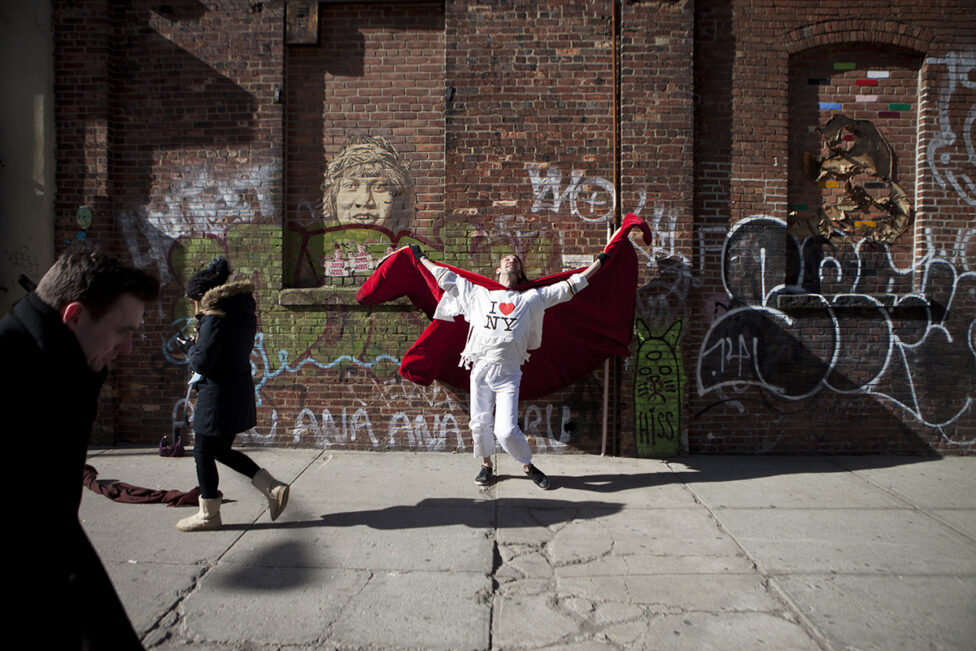
Stanley Love, 2017, Photo by Miana Jun
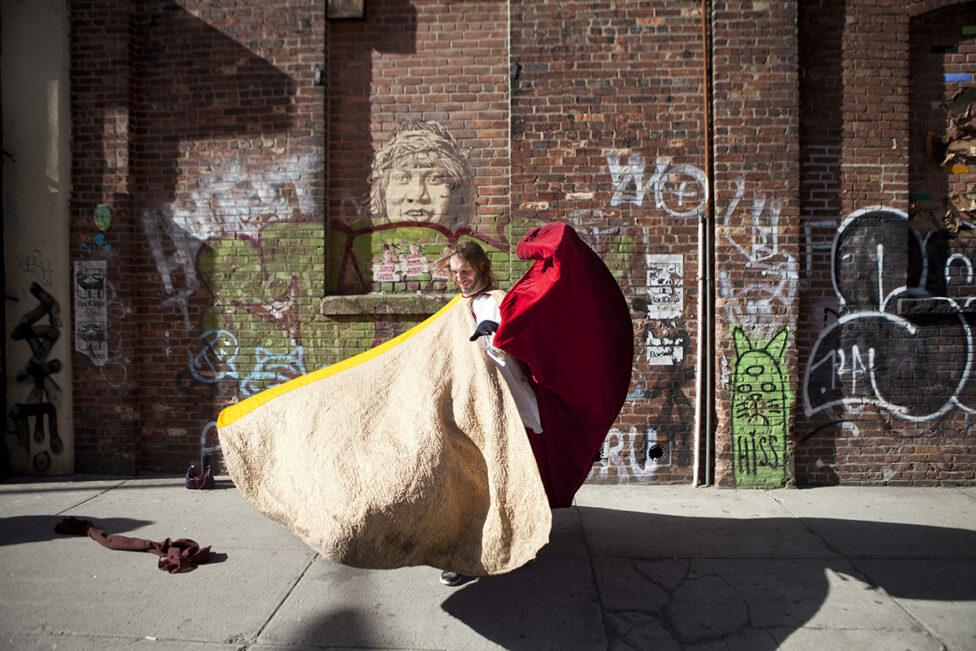
Stanley Love, 2017, Photo by Miana Jun

